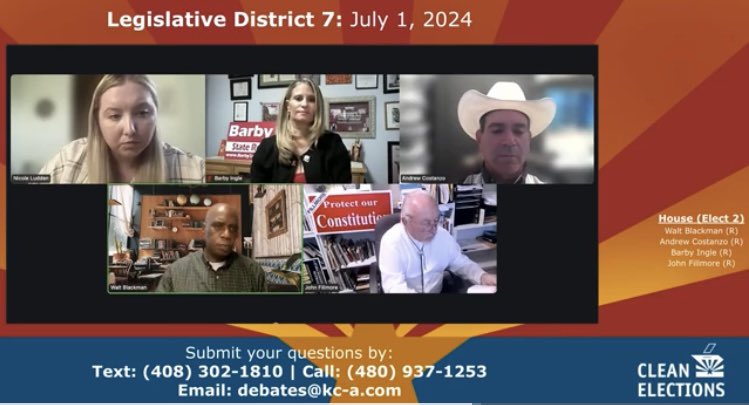Q1. Establish Clear Evaluation Criteria – Background and Qualifications
Define what matters most to your community. As a conservative advocate, your criteria might include:
- Alignment with Conservative Values: Support for limited government, personal responsibility, Second Amendment rights, border security, and election integrity (key Arizona Republican House Caucus priorities).
- Healthcare and Patient Advocacy: Commitment to reforming healthcare policies, ensuring access to pain management (e.g., responsible opioid prescribing), and supporting mental health, reflecting your iPain leadership.
- Integrity and Transparency: A track record of honesty, accountability, and willingness to engage with constituents.
- Experience and Competence: Relevant background (e.g., legislative, community, or professional experience) to navigate state-level issues like Arizona’s divided trifecta (Democratic governor, Republican legislature).
- Community Connection: Strong ties to the district, understanding local needs.
- Action: Create a checklist of these criteria, weighted by importance. Share it with your network to build consensus.
Q2. Research Public and Private Records – Policy Positions and Priorities
Investigate the candidate’s background to verify their claims and uncover potential red flags.
- Voting Record (if Incumbent): Review their legislative history on www.azleg.gov for votes on key issues like border security (Proposition 314) or healthcare bills. Check attendance at Arizona Republican House Caucus meetings, committee meetings, and floor votes – look for disengagement of incumbents.
- Campaign Finance: Examine contributions on the Arizona Secretary of State’s website (www.azsos.gov) to identify major donors, PACs, or special interest groups.
- Public Statements: Analyze speeches, debates, and posts on platforms like X for consistency.
- Legal and Ethical History: Search court records for lawsuits or ethics violations. Check news archives for scandals.
- Professional Background: Verify resumes via LinkedIn, company records, or professional associations. Confirm claimed expertise aligns with their experience.
- Action: Assign a trusted team member (e.g., a campaign volunteer) to compile a dossier. Cross-reference findings with credible sources to avoid misinformation or ask the candidate.
A2. As a conservative Republican, I champion limited government, personal freedom, and patient-driven healthcare. My priorities for LD7 include reforming healthcare to ensure access to pain management and mental health services, securing our borders, and supporting rural needs like water and agriculture, vital to LD7’s roots. I’ve worked on over 100 bills across 35 states, including seven in Arizona, to promote transparency and accountability. I oppose overreaching regulations and I’ll fight for policies that let Arizonans thrive, not just survive.
Q3. Engage Directly with the Candidate – Legislative Experience and Effectiveness
- Personal interaction reveals character, responsiveness, and policy depth.
- Attend Public Events: Visit town halls, debates, or meet-and-greets. Ask pointed questions. Gauge their knowledge and empathy.
- Request a Meeting: As a prominent advocate, request a one-on-one (in-person or virtual meeting) to discuss your priorities—healthcare reform, patient rights, or mental health funding. Assess their willingness to listen to a variety of voters.
- Submit Written Questions: Send a questionnaire covering your criteria. Set a deadline to test responsiveness, a key trait for state legislators.
- Observe Body Language: Watch for sincerity or discomfort when they address tough issues.
- Action: Document their answers and demeanor. Share insights with your community to crowdsource feedback.
A3. My legislative track record is robust, with hands-on experience shaping policy. I authored Arizona Senate Bill 1469 & 1162 (2022), both passed into law giving enhance the Controlled Substances Prescription Monitoring Program while protecting patient privacy and better access to patient care. I also authored House Bill 2291 and co-authored House Bill 2380 (Rare Disease Advocacy Bill), both advancing healthcare access in 2025. All 4 bills do not add any fiscal responsibility to the AZ budget. My work on 100+ bills across 35 states, including testifying before Congress and the FDA, shows I can navigate Arizona’s divided trifecta to pass meaningful laws.
Q4. Evaluate Policy Positions and Legislative Viability – Community Engagement and Accessibility
- Assess the candidate’s platform and ability to deliver in Arizona’s political landscape.
- Review Campaign Platform: Check their website or materials for detailed positions. Compare them to Republican priorities (e.g., Heritage Action’s 2024 scorecard) and your advocacy goals).
- Legislative Feasibility: Consider their ability to navigate Arizona’s divided trifecta.
- Track Record on Key Issues: If they’ve held office, review their sponsorship of bills. For newcomers, evaluate their public advocacy or community work.
- Alignment with District Needs: Ensure they address local issues/district specific needs.
- Action: Score their platform against your checklist. Discuss with local Republican leaders (e.g., precinct committeemen) to gauge their legislative potential.
- Action: Compile feedback into a pros-and-cons list. Host a discussion (e.g., at a Republican club meeting) to refine your assessment.
A4. I’m deeply rooted in LD7, living in Pinal County with my husband, Ken Taylor, and serving as a precinct committeeman, state delegate, and poll worker and observer. My Barby Zone Podcast, “Barby-Q for Life” fundraiser in 2025 and bonfires bring our community together, and my NERVEmber initiative raises nerve pain awareness globally. I engage through town halls, X posts, participation in civic and military organizations and iPain events, ensuring every voice is heard. My 2024 campaign showed my commitment to my accessibility, and I pledge regular constituent meetings to address local needs like HOA reforms and healthcare access.
Q5. Assess Commitment and Accessibility – Alignment with Conservative Values and Integrity and Transparency
- Test the candidate’s dedication to serving and staying connected.
- Campaign Activity: Evaluate their effort—door-knocking, forums, or social media engagement. A candidate who skips events (like caucus meetings) may neglect constituents post-election.
- Responsiveness: Email or call their campaign with a question.
- Community Presence: Check if they attend local events (e.g., Apache Junction town halls)
- Post-Election Plan: Ask how they’ll stay accountable (e.g., regular town halls, newsletters).
- Action: Track their responsiveness and presence over a month.
A5. My conservative values—personal responsibility, limited government, and individual liberty—align with the Arizona Republican GOP, Christians, Conservatives, Constitutional Republicans, and LD7 voters. I support Second Amendment rights, school choice, border security, pro-life, and election integrity, reflecting the party’s platform. My 2024 campaign and work with groups like the PCRC show my commitment to constitutional conservatism. As a patient advocate, I fight government overreach, to protect Arizonans’ God-given rights. Integrity is my cornerstone. My 20+ years of advocacy, 45+ awards, and transparent media presence (2,000+ appearances) prove my honesty and accountability. My campaign finances, available on www.azsos.gov, show no ties to special interests. I’ve called out regulatory failures, like the FDA’s two-day PMR review window, and I’ll bring that same candor to the House, ensuring LD7 voters know where I stand. Unlike absentees who skip caucus meetings, I’m committed to open, consistent service.
Q6. Monitor Red Flags and Deal Breakers – Ability to Navigate Arizona’s Political Landscape
- Identify issues that disqualify a candidate.
- Inconsistent Values: Flip-flopping on core issues undermines trust.
- Ethical Lapses: Any hint of corruption, dishonesty, or conflicts of interest is a non-starter.
- Neglect of Duty: Missing critical meetings (e.g., every caucus session) or failing to engage with constituents signals they’ll prioritize personal interests over public service.
A6. Arizona’s divided trifecta demands savvy coalition-building, and I’m ready. I am also hoping that in 2026, we are able to also vote in Congressman Andy Biggs as Governor and keep the house and senate conservative. My success on bills like SB 1469 and HB 2380 shows I can work across aisles while holding firm to conservative principles. I’ve countered vetoes from Governor Hobbs by building grassroots support, as seen in my 2024 campaign. My relationships with Republican leaders, forged as a state committeeman, and my policy expertise from 100+ bills ensure I can advance LD7’s priorities—healthcare, rural needs, and security—despite political gridlock.
Q7. Make an Informed Decision – Commitment to Constituent Needs
- Synthesize your findings to choose the best candidate or guide your endorsement.
- Compare Candidates: If multiple candidates are running (e.g., in a primary), rank them based on your checklist. Use a scoring system (e.g., 1–10 for each criterion) for objectivity.
- Endorse or Oppose: If a candidate excels (or fails), make a public stance.
- Stay Engaged: Even after choosing, monitor the candidate’s actions.
- Action: Finalize your decision by a set date (e.g., before the primary).





